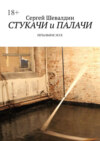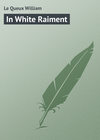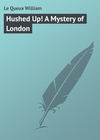Читать книгу: «Mademoiselle of Monte Carlo», страница 9
“And if they do, he will most certainly clear himself, Mr. Sherrard,” she said coldly.
“Ah! You still have great faith in him,” he laughed airily. “Well—we shall see,” and he grinned.
“Yes, Mr. Sherrard. I still have faith in Mr. Henfrey. I know him well enough to be certain that he is no assassin.”
“Then I ask you, Dorise, why is he hiding?” said her companion. “If he is innocent, what can he fear?”
“I know he is innocent.”
“Of course. You must remain in that belief until he is found guilty.”
“You already condemn him!” the girl cried in anger. “By what right do you do this, I ask?”
“Well, common sense shows that he is in fear lest the truth should come to light,” was Sherrard’s lame reply. “He escaped very cleverly from Monte Carlo the moment he heard that the police suspected him, but where is he now? Nobody knows. Haynes, of Scotland Yard, who made the inquiries when my flat in Park Lane was broken into, tells me they have had a description of him from the Paris police, and that a general hue-and-cry has been circulated.”
“But the woman is still alive, is she not?”
“Yes. She’s a hopeless idiot, Haynes tells me. She had developed homicidal mania as a result of the bullet wound in the head, and they have had to send her to a private asylum at Cannes. She’s there in close confinement.”
Dorise paused. Her anger had risen, and her cheeks were flushed. The sandwich she was eating choked her, so she cast it into the river.
Then she rose abruptly, and looking very straight into the man’s eyes, said:
“I consider, Mr. Sherrard, that you are absolutely horrid. Mr. Henfrey is a friend of mine, and whatever gossip there is concerning him I will not believe until I hear his story from his own lips.”
“I merely tell you of the report from France to Scotland Yard,” said Sherrard.
“You tell me this in order to prejudice me against Hugh—to—to–”
“Hugh! Whom you love—eh?” sneered Sherrard.
“Yes. I do love him,” the girl blurted forth. “I make no secret of it. And if you like you can tell my mother that! You are very fond of acting as her factotum!”
“It is to be regretted, Dorise, that you have fallen in love with a fellow who is wanted by the police,” he remarked with a sigh.
“At any rate, I love a genuine man,” she retorted with bitter sarcasm. “I know my mother’s intention is that I shall marry you. But I tell you here frankly—as I stand here—I would rather kill myself first!”
George Sherrard with his dark bushy brows and thick lips only laughed at her indignation. This incensed her the more.
“Yes,” she went on. “You may be amused at my distress. You have laughed at the distress of other women, Mr. Sherrard. Do not think that I am blind. I have watched you, and I know more concerning your love affairs of the past than you ever dream. So please leave Blairglas as soon as you can with decency excuse yourself, and keep away from me in future.”
“But really, Dorise–!” he cried, advancing towards her.
“I mean exactly what I say. Let me get back. When I go fishing I prefer to go alone,” the girl said.
“But what am I to say to Lady Ranscomb?”
“Tell her that I love Hugh,” laughed the girl defiantly. “Tell her that I intend to defeat all her clever intrigues and sly devices!”
His countenance now showed that he was angry. He and Lady Ranscomb thoroughly understood each other. He admired the girl, and her mother had assured him her affection for Hugh Henfrey was but a passing fancy. This stubborn outburst was to him a complete revelation.
“I have no knowledge of any intrigue, Dorise,” he said in that bland, superior manner which always irritated her. She knew that a dozen mothers with eligible feminine encumbrances were trying to angle him, and that Lady Ranscomb was greatly envied by them. But to be the wife of the self-conscious ass—well, as she has already bluntly told him, she would die rather than become Mrs. George Sherrard.
“Intrigue!” the girl retorted. “Why, from first to last the whole thing is a plot between my mother and yourself. Please give me credit for just a little intelligence. First, I despise you as a coward. During the war you crept into a little clerkship in the Home Office in order to save your precious skin, while Hugh went to the front and risked his life flying a ‘bomber’ over the enemy’s lines. You were a miserable stay-at-home, hiding in your little bolt-hole in Whitehall when the Zepps came over, while Hugh Henfrey fought for his King and for Britain. Now I am quite frank, Mr. Sherrard. That’s why I despise you!” and the girl’s pale face showed two pink spots in the centre of her cheeks.
“Really,” he said in that same superior tone which he so constantly assumed. “I must say that you are the reverse of polite, Miss Dorise,” and his colour heightened.
“I am! And I intend to be so!” she cried in a frenzy, for all her affection for Hugh had in those moments been redoubled. Her lover was accused and had no chance of self-defence. “Go back to my mother,” she went on. “Tell her every word I have said and embroider it as much as you like. Then you can both put your wits together a little further. But, remember, I shall exert my own woman’s wits against yours. And as soon as you feel it practicable, I hope you will leave Blairglas. And further, if you have not left by noon to-morrow, I will tell my maid, Duncan, the whole story of this sinister plot to part me from Hugh. She will spread it, I assure you. Maids gossip—and to a purpose when their mistresses will it so.”
“But Dorise—”
“Enough! Mr. Sherrard. I prefer to walk up to the Castle by myself. Murray will bring up the rods. Please tell my mother what I say when you get back,” she added. “The night train from Perth to London leaves at nine-forty to-night,” she said with biting sarcasm.
Then turning, she began to ascend the steep path which led from the river bank into a cornfield and through the wood, while the man stood and bit his lip.
“H’m!” he growled beneath his breath. “We shall see!—yes, we shall see!”
FOURTEENTH CHAPTER
RED DAWN
That night when Dorise, in a pretty, pale-blue evening gown, entered the great, old panelled dining-room rather late for dinner, her mother exclaimed petulantly:
“How late you are, dear! Mr. Sherrard has had a telegram recalling him to London. He has to catch the nine-something train from Perth.”
“Have you?” she asked the man who was odious to her. “I’m so sorry I’m late, but that Mackenzie girl called. They are getting up a bazaar for the old people down in the village, and we have to help it, I suppose. Oh! these bazaars, sales of work, and other little excuses for extracting shillings from the pockets of everybody! They are most wearying.”
“She called on me last week,” said Lady Ranscomb. “Newte told her I was not at home.”
The old-fashioned butler, John Newte, a white-haired, rosy-faced man, who had seen forty years’ service with the ducal owner of Blairglas, served the dinner in his own stately style. Sir Richard had been a good master, but things had never been the same since the castle had passed into its new owner’s hands.
Dorise endeavoured to be quite affable to the smooth-haired man seated before her, expressing regret that he was called away so suddenly, while he, on his part, declared that it was “awful hard luck,” as he had been looking forward to a week’s good sport on the river.
“Do come back, George,” Lady Ranscomb urged. “Get your business over and get back here for the weekend.”
“I’ll try,” was Sherrard’s half-hearted response, whereat Newte entered to announce that the car was ready.
Then he bade mother and daughter adieu, and went out.
Dorise could see that her mother was considerably annoyed at her plans being so abruptly frustrated.
“We must ask somebody else,” she said, as they lingered over the dessert. “Whom shall we ask?”
“I really don’t care in the least, mother. I’m quite happy here alone. It is a rest. We shall have to be back in town in a fortnight, I suppose.”
“George could quite well have waited for a day or two,” Lady Ranscomb declared. “I went out to see the Muirs, at Forteviot, and when I got back he told me he had just had a telegram telling him that it was imperative he should be in town to-morrow morning. I tried to persuade him to stay, but he declared it to be impossible.”
“An appointment with a lady, perhaps,” laughed Dorise mischievously.
“What next, my dear! You know he is over head and ears in love with you!”
“Oh! That’s quite enough, mother. You’ve told me that lots of times before. But I tell you quite frankly his love leaves me quite cold.”
“Ah! dear. That reply is, after all, but natural. You, of course, won’t confess the truth,” her mother laughed.
“I do, mother. I’m heartily glad the fellow has gone. I hate his supercilious manner, his superior tone, and his unctuous bearing. He’s simply odious! That’s my opinion.”
Her mother looked at her severely across the table.
“Please remember, Dorise, that George is my friend.”
“I never forget that,” said the girl meaningly, as she rose and left the table.
Half an hour later, when she entered her bedroom, she found Duncan, her maid, awaiting her.
“Oh! I’ve been waiting to see you this half hour, miss,” she said. “I couldn’t get you alone. Just before eight o’clock, as I was about to enter the park by the side gate near Bervie Farm, a gentleman approached me and asked if my name was Duncan. I told him it was, and then he gave me this to give to you in secret. He also gave me a pound note, miss, to say nothing about it.” And the prim lady’s maid handed her young mistress a small white envelope upon which her name was written.
Opening it, she found a plain visiting card which bore the words in a man’s handwriting:
“Would it be possible for you to meet me to-night at ten at the spot where I have given this to your maid? Urgent.—SILVERADO.”
Dorise held her breath. It was a message from the mysterious white cavalier who had sought her out at the bal blanc at Nice, and told her of Hugh’s peril!
Duncan was naturally curious owing to the effect the card had had upon her mistress, but she was too well trained to make any comment. Instead, she busied herself at the wardrobe, and a few moments afterwards left the room.
Dorise stood before the long cheval glass, the card still in her hand.
What did it mean? Why was the mysterious white cavalier in Scotland? At least she would now be able to see his face. It was past nine, and the moon was already shining. She had still more than half an hour before she went forth to meet the man of mystery.
She descended to the drawing-room, where her mother was reading, and after playing over a couple of songs as a camouflage, she pretended to be tired and announced her intention of retiring.
“We have to go into Edinburgh to-morrow morning,” her mother remarked. “So we should start pretty early. I’ve ordered the car for nine o’clock.”
“All right, mother. Good-night,” said the girl as she closed the door.
Then hastening to her room she threw off her dinner gown, and putting on a coat and skirt and the boots which she had worn when fishing that morning, she went out by a door which led from the great old library, with its thousands of brown-backed volumes, on to the broad terrace which overlooked the glen, now a veritable fairyland beneath the light of the moon.
Outside the silence was only broken by the ripple of the burn over its pebbles deep below, and the cry of the night-bird upon the steep rock whereon the historic old castle was built. By a path known to her she descended swiftly, and away into the park by yet another path, used almost exclusively by the servants and the postman, down to a gate which led out into the high road to Perth by one of the farms on the estate, the one known as the Bervie.
As she was about to pass through the small swing gate, she heard a voice which she recognized exclaim:
“Miss Ranscomb! I have to apologize!” And from the dark shadow a rather tall man emerged and barred her path.
“I daresay you will think this all very mysterious,” he went on, laughing lightly. “But I do hope I have not inconvenienced you. If so, pray accept my deepest apologies. Will you?”
“Not at all,” the girl replied, though somewhat taken aback by the suddenness of the encounter. The man spoke slowly and with evident refinement. His voice was the same she had heard at Nice on that memorable night of gaiety. She recognized it instantly.
As he stood before her, his countenance became revealed in the moonlight, and she saw a well-moulded, strongly-marked face, with a pair of dark, penetrating eyes, set a little too close perhaps, but denoting strong will and keen intelligence.
“Yes,” he laughed. “Look at me well, Miss Ranscomb. I am the white cavalier whom you last saw disguised by a black velvet mask. Look at me again, because perhaps you may wish to recognize me later on.”
“And you are still Mr. X—eh?” asked the girl, who had halted, and was gazing upon his rather striking face.
“Still the same,” he said, smiling. “Or you may call me Brown, Jones, or Robinson—or any of the other saints’ names if you prefer.”
“You have been very kind to me. Surely I may know your real name?”
“No, Miss Ranscomb. For certain very important reasons I do not wish to disclose it. Pardon me—will you not? I ask that favour of you.”
“But will you not satisfy my curiosity?”
“At my personal risk? No. I do not think you would wish me to do that—eh?” he asked in a tone of mild reproof.
Then he went on:
“I’m awfully sorry I could not approach you openly. In London I found out that you were up here, so I thought it best to see you in secret. You know why I have come to you, Miss Ranscomb—eh?”
“On behalf of Mr. Henfrey.”
“Yes. He is still in hiding. It has been impossible—through force of circumstances—for him to send you further messages.”
“Where is he? I want to see him.”
“Have patience, Miss Ranscomb, and I will arrange a meeting between you.”
“But why do the police still search for him?”
“Because of an unfortunate fact. The lady, Mademoiselle Ferad, is now confined to a private asylum at Cannes, but all the time she raves furiously about Monsieur Henfrey. Hence the French police are convinced that he shot her—and they are determined upon his arrest.”
“But do you think he is guilty?”
“I know he is not. Yet by force of adverse circumstances, he is compelled to conceal himself until such time that we can prove his innocence.”
“Ah! But shall we ever be in a position to prove that?”
“I hope so. We must have patience—and still more patience,” urged the mysterious man as he stood in the full light of the brilliant moon. “I have here a letter for you which Mr. Henfrey wrote a week ago. It only came into my hands yesterday.” And he gave her an envelope.
“Tell me something about this woman, Mademoiselle of Monte Carlo. Who is she?” asked Dorise excitedly.
“Well—she is a person who was notorious at the Rooms, as you yourself know. You have seen her.”
“And tell me, why do you take such an interest in Hugh?” inquired the girl, not without a note of suspicion in her voice.
“For reasons best known to myself, Miss Ranscomb. Reasons which are personal.”
“That’s hardly a satisfactory reply.”
“I fear I can give few satisfactory replies until we succeed in ascertaining the truth of what occurred at the Villa Amette,” he said. “I must urge you, Miss Ranscomb, to remain patient, and—and not to lose faith in the man who is wrongfully accused.”
“But when can I see him?” asked Dorise eagerly.
“Soon. But you must be discreet—and you must ask no questions. Just place yourself in my hands—that is, if you can trust me.”
“I do, even though I am ignorant of your name.”
“It is best that you remain in ignorance,” was his reply. “Otherwise perhaps you would hesitate to trust me.”
“Why?”
But the tall, good-looking man only laughed, and then he said:
“My name really doesn’t matter at present. Later, Miss Ranscomb, you will no doubt know it. I am only acting in the interests of Henfrey.”
Again she looked at him. His face was smiling, and yet was sphinx-like in the moonlight. His voice was certainly that of the white cavalier which she recollected so well, but his personality, so strongly marked, was a little overbearing.
“I know you mistrust me,” he went on. “If I were in your place I certainly should do so. A thousand pities it is that I cannot tell you who I am. But—well—I tell you in confidence that I dare not!”
“Dare not! Of what are you afraid?” inquired Dorise. The man she had met under such romantic circumstances interested her keenly. He was Hugh’s go-between. Poor Hugh! She knew he was suffering severely in his loneliness, and his incapability to clear himself of the terrible stigma upon him.
“I’m afraid of several things,” replied the white cavalier. “The greatest fear I have is that you may not believe in me.”
“I do believe in you,” declared the girl.
“Excellent!” he replied enthusiastically. “Then let us get to business—pardon me for putting it so. But I am, after all, a business man. I am interested in a lot of different businesses, you see.”
“Of what character?”
“No, Miss Ranscomb. That is another point upon which I regret that I cannot satisfy your pardonable curiosity. Please allow your mind to rest upon the one main point—that I am acting in the interests of the man with—the man who is, I believe, your greatest and most intimate friend.”
“I understood that when we met in Nice.”
“Good! Now I understand that your mother, Lady Ranscomb, is much against your marriage with Hugh Henfrey. She has other views.”
“Really! Who told you that?”
“I have ascertained it in the course of my inquiry.”
Dorise paused, and then looking the man of mystery straight in the face, asked:
“What do you really know about me?”
“Well,” he laughed lightly. “A good deal. Now tell me when could you be free to get away from your mother for a whole day?”
“Why?”
“I want to know. Just tell me the date. When are you returning to London?”
“On Saturday week. I could get away—say—on Tuesday week.”
“Very good. You would have to leave London by an early train in the morning—if I fail to send a car for you, which I hope to do. And be back again late at night.”
“Why?”
“Why,” he echoed. “Because I have a reason.”
“I believe you will take me to meet Hugh—eh? Ah! How good you are!” cried the girl in deep emotion. “I shall never be able to thank you sufficiently for all you are doing. I—I have been longing all these weeks to see him again—to hear his explanation why he went to the woman’s house at that hour—why–”
“He will tell you everything, no doubt,” said her mysterious visitor. “He will tell you everything except one fact.”
“And what is that?” she asked breathlessly.
“One fact he will not tell you. But you will know it later. Hugh Henfrey is a fine manly fellow, Miss Ranscomb. That is why I have done my level best in his interest.”
“But why should you?” she asked. “You are, after all, a stranger.”
“True. But you will know the truth some day. Meanwhile, leave matters as they are. Do not prejudge him, even if the police are convinced of his guilt. Could you be at King’s Cross station at ten o’clock on the morning of Tuesday week? If so, I will meet you there.”
“Yes,” she replied. “But where are we going?”
“At present I have no idea. When one is escaping from the police one’s movements have to be ruled by circumstances from hour to hour. I will do my best on that day to arrange a meeting between you,” he added.
She thanked him very sincerely. He was still a mystery, but his face and his whole bearing attracted her. He was her friend. She recollected his words amid that gay revelry at Nice—words of encouragement and sympathy. And he had travelled there, far north into Perthshire, in order to carry the letter which she had thrust into her pocket, yet still holding it in her clenched hand.
“I do wish you would tell me the motive of your extreme kindness towards us both,” Dorise urged. “I can’t make it out at all. I am bewildered.”
“Well—so am I, Miss Ranscomb,” replied the tall, elegant man who spoke with such refinement, and was so shrewd and alert. “There are certain facts—facts of which I have no knowledge. The affair at the Villa Amette is still, to me, a most profound mystery.”
“Why did Hugh go there at all? That is what I fail to understand,” she declared.
“Don’t wonder any longer. He had, I know, an urgent and distinct motive to call that night.”
“But the woman! I hear she is a notorious adventuress.”
“And the adventuress, Miss Ranscomb, often has, deep in her soul, the heart of a pure woman,” he said. “One must never judge by appearance or gossip. What people may think is the curse of many of our lives. I hope you do not misjudge Mr. Henfrey.”
“I do not. But I am anxious to hear his explanation.”
“You shall—and before long, too,” he replied. “But I want you, if you will, to answer a question. I do not put it from mere idle curiosity, but it very closely concerns you both. Have you ever heard him speak of a girl named Louise Lambert?”
“Louise Lambert? Why, yes! He introduced her to me once. She is, I understand, the adopted daughter of a man named Benton, an intimate friend of old Mr. Henfrey.”
“Has he ever told you anything concerning her?”
“Nothing much. Why?”
“He has never told you the conditions of his father’s will?”
“Never—except that he has been left very poorly off, though his father died in affluent circumstances. What are the conditions?”
The mysterious stranger paused for a moment.
“Have you, of late, formed an acquaintance of a certain Mrs. Bond, a widow?”
“I met her recently in South Kensington, at the house of a friend of my mother, Mrs. Binyon. Why?”
“How many times have you met her?”
“Two—or I think three. She came to tea with us the day before we came up here.”
“H’m! Your mother seems rather prone to make easy acquaintanceships—eh? The Hardcastles were distinctly undesirable, were they not?—and the Jameses also?”
“Why, what do you know about them?” asked the girl, much surprised, as they were two families who had been discovered to be not what they represented.
“Well,” he laughed. “I happen to be aware of your mother’s charm—that’s all.”
“You seem to know quite a bit about us,” she remarked. “How is it?”
“Because I have made it my business to know, Miss Ranscomb,” he replied. “Further, I would urge upon you to have nothing to do with Mrs. Bond.”
“Why not? We found her most pleasant. She is the widow of a wealthy man who died abroad about two years ago, and she lives somewhere down in Surrey.”
“I know all about that,” he answered in a curious tone. “But I repeat my warning that Mrs. Bond is by no means a desirable acquaintance. I tell you so for your own benefit.”
Inwardly he was angry that the woman should have so cleverly made the acquaintance of the girl. It showed him plainly that Benton and she were working on a set and desperate plan, while the girl before him was entirely ignorant of the plot.
“Now, Miss Ranscomb,” he added, “I want you to please make me a promise—namely, that you will say nothing to a single soul of what I have said this evening—not even to your friend, Mr. Henfrey. I have very strong reasons for this. Remember, I am acting in the interests of you both, and secrecy is the essence of success.”
“I understand. But you really mystify me. I know you are my friend,” she said, “but why are you doing all this for our benefit?”
“In order that Hugh Henfrey may return to your side, and that hand in hand you may be able to defeat your enemies.”
“My enemies! Who are they?” asked the girl.
“One day, very soon, they must reveal themselves. When they do, and you find yourself in difficulties, you have only to call upon me, and I will further assist you. Advertise in the Times newspaper at any time for an appointment with ‘Silverado.’ Give me seven days, and I will keep it.”
“But do tell me your name!” she urged, as they moved together from the pathway along the road in the direction of Perth. “I beg of you to do so.”
“I have already begged a favour of you, Miss Ranscomb,” he answered in a soft, refined voice. “I ask you not to press your question. Suffice it that I am your sincere friend.”
“But when shall I see Hugh?” she cried, again halting. “I cannot bear this terrible suspense any longer—indeed I can’t! Can I go to him soon?”
“No!” cried a voice from the shadow of a bush close beside them as a dark alert figure sprang forth into the light. “It is needless. I am here, dearest!—at last!”
And next second she found herself clasped in her lover’s strong embrace, while the stranger, utterly taken aback, stood looking on, absolutely mystified.
Покупайте книги и получайте бонусы в Литрес, Читай-городе и Буквоеде.
Участвовать в бонусной программе




















